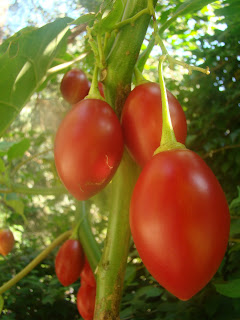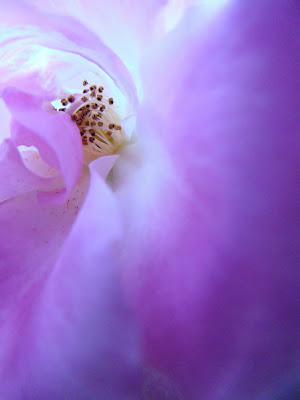Here are the first fruits on our young tree tomato, known in some places as the tomarillo...
The graceful, big-leaved tree's starry waxy-white flowers blossomed at the end of Autumn, and the fruits grew and ripened over the long winter months. We literally waited for the fruits to fall to the ground, and then foraged for them rather than harvested. Grace discovered that she is not a fan of the tree tomato's fruits - a bit disappointing after being impressed by their smooth jewel-shaped elegance and watching their ripening in anticipation for so long. She's a great lover of real tomatoes, but of course in the muddling way that we so often name things, this tree is not actually related to the tomato family at all. So it was left to me to enjoy its unique taste sensations - a touch of sharp bitterness yielding to a soft, tropical, guava-like heart.
Now the long cold, wet winter has finally passed, and it has been time to rejuvenate our food garden - clear the mint that has been set on food garden domination, recondition the soil with compost and worm castings, and plant new seeds and seedlings. We can look forward to spinach, celery, strawberries, Italian parsley, radishes, pumpkins, parsnips, carrots and some real tomatoes!
Travelling With Grace
Tuesday, October 9, 2012
Monday, May 23, 2011
The Mantis Goddess
On a mild Autumn Saturday afternoon, she made a jagged flight into our garden, and headed straight for my boots. I moved my feet, and she climbed up the smooth leg of my chair with some difficulty but an impressive determination...
We moved her to the safety of the flower-bed, but she was on an intriguing mission, and she wasn't that interested in safety. It is possible that Autumn is breeding time for the Mantis in our part of the world.

She was not shy. She leapt onto the lens of my camera, a few times!...

Eventually, she made her way across the lawn to an ancient cypress tree, and climbed up it until we lost sight of her. A beautiful creature with a powerful energy.

She is a queen, and a fine poseur...
She was not shy. She leapt onto the lens of my camera, a few times!...

Eventually, she made her way across the lawn to an ancient cypress tree, and climbed up it until we lost sight of her. A beautiful creature with a powerful energy.
In southern Africa, the indigenous Khoi and San people regarded the Mantis as a god...
Thursday, April 21, 2011
Life goes on
Perhaps Life's greatest quality
is its relentlessness
is its relentlessness
Life doesn't need me and it doesn't need you
A plant or an ant, will do
I like this toughness
I don't actually care that I am superfluous
I always hope that Life wins
I also always hope though,
that as a species, we might make the choices
that support winning side
because
Life is beautiful
that support winning side
because
Life is beautiful
Wednesday, November 10, 2010
Riding the Waves
There are times when I feel overwhelmed by the scale and pace of the destruction of Life on Earth. I get into the grip of that "too little too late" fear, and with the despair comes a deep weariness of spirit. During those times I don't want to learn anything else about the problems; I don't want to hear about another ecological disaster or ongoing struggle; I don't even want to know about another 'bright green' solution that is ever so bright but still not BIG enough to actually change things...
During those times, all I want to do is curl up inside the beauty of the world, and let it be all that is... just for a little while...
Safe for a moment. And then, I can recognise that the despair is a reason for apathy, an excuse for carelessness. Refreshed for a moment. And then, I can acknowledge that my hope for sustainable human existence is a powerful force for creating the long future I want for my child and her children; and my despair is part of the problem! Inspired for a moment. And then, I realise I should be spending more of my time immersed in David Attenborough's TV series than reading the news!
Saturday, October 30, 2010
Year of the Tiger
2010 is the Chinese Year of the Tiger, and also the United Nation's International Year of Biodiversity. While the polar bear is a most arresting poster species of climate change, probably no other animal can fit the same role as well as the tiger when it comes to looming mass extinction and our ongoing loss of the Earth's biodiversity. Despite years of conservation funding, all sorts of legal protections and masses of blood, sweat and tears from dedicated human champions, tigers are still worse off in 2010 than they have ever been.
The animal most widely regarded by humans as the most beautiful of all, endlessly evocative to poets and artists, and the epitome of wildness to many nature-lovers, remains precariously confined, in the smallest of numbers, to pitiful, isolated slivers of land; as vulnerable as ever to death by poaching humans, mostly for consumption for completely superstitious or egocentric reasons.
How can this be?
In the days before I gave birth to my child, a friend came by with a pile of books she had cleared out. Amongst them was Ruth Padel's Tigers in Red Weather. I pounced on it. Here was a celebrated British poet and great-great-granddaughter of Charles Darwin writing of her travels through tigerlands in 2005. It was irresistible, and after my daughter was born I ignored the wisdom 'to sleep when baby sleeps', and instead lay with sleeping child in my arms as I consumed the book. While I relished the quality of the writing so much, the dismal plight of tigers hit home very hard; extra cutting when you have just brought a new life into the world.
What is happening to this world?
190 countries have just reached agreement in Nagoya, Japan on 20 goals to minimise mass extinction in the next 10 years. This includes increasing the amount of protected land from 12.5% to 17%. The area of protected ocean will increase from 1% to 10%. This is being heralded as a landmark agreement. Every gain, no matter how paltry is a gain. Yes.
Of course, what justifies the decimation of wildlands and the extinction of species is always "human interest". We've got to look after business first; then people, then tigers, then habitats, then eco-systems, then the Planet. We're still way short of the acknowledgement that all human interest is irrevocably embedded in Nature. There is no business on Earth without the eco-system services that sustain life. We need biology because we are biology. How much do we need to lose before we understand this? When do we look to our precious children and say it is not okay to bequeath this world of loss to them?
There are probably no more than 3000 wild tigers alive today.
At the top of their particular food chain, tigers are a measure of the health of our eco-systems. As their viable populations collapse, so millions of other species are vulnerable to collapse too.
Read more: Convention on Biological Diversity http://www.cbd.int/2010/welcome/
http://www.telegraph.co.uk/earth/earthnews/8098540/Landmark-UN-Nagoya-biodiversity-deal-agreed-to-save-natural-world.html
http://www.nytimes.com/2010/10/21/opinion/21iht-edlovejoy.html?_r=1
Friday, October 15, 2010
Blog Action Day 2010
The theme for Blog Action Day 2010 is water. The problems are so vast and varied, it seems the world over, wherever there is water, we're wasting it, polluting it and killing off all life in it. In comparison, the solutions being implemented seem so very small and limited. For example, it is a good idea for individuals to choose not to buy bottled water; but what would be revolutionary is if the beverage companies all committed to never bottling water again! That kind of sweeping change in consciousness would feel like the kind of triumph we are sorely missing at the moment. However, in commemoration of Blog Action Day, I don't want to be a harbinger of doom. So I am remembering this wisdom from Tom Robbins, and applying it to the waters of the world:
This is not a quote but an accurate paraphase of the gist of the message:
If you look at the world through one eye and see everything that is wrong; look at it then and vow to live in such a way that you change what is wrong. If you look at the world through the other eye and see the beautiful fields stretching to the majestic mountains against the backdrop of a glorious sky, know that the world is also perfect. Then open both eyes and hold these two ideas of the world in your mind's eye in perfect, dynamic balance. For if you see only out of the first eye, you will be a contributor to the darkness of the world; and if you look only out of the other eye, you will be vapid and ineffectual.
Water is in trouble and needs as much good action from us that it can get. Water is also beautiful and stupendous, glorious and life-giving, awesome and unfathomable. It will, of course, survive us; but I hope it won't have to.
This is not a quote but an accurate paraphase of the gist of the message:
If you look at the world through one eye and see everything that is wrong; look at it then and vow to live in such a way that you change what is wrong. If you look at the world through the other eye and see the beautiful fields stretching to the majestic mountains against the backdrop of a glorious sky, know that the world is also perfect. Then open both eyes and hold these two ideas of the world in your mind's eye in perfect, dynamic balance. For if you see only out of the first eye, you will be a contributor to the darkness of the world; and if you look only out of the other eye, you will be vapid and ineffectual.
Water is in trouble and needs as much good action from us that it can get. Water is also beautiful and stupendous, glorious and life-giving, awesome and unfathomable. It will, of course, survive us; but I hope it won't have to.
Labels:
Blog Action Day 2010,
consciouness,
Tom Robbins,
water
Thursday, October 14, 2010
Living Wall for World Food Day
 |
| This is not one of my photographs - copyright Woolies |
Happy to admit my bias - I wrote the copy for this campaign. I love it. It is a wonderful virtual rendition of a permaculture design for vertical food gardening. Just a few clicks and you plant a strawberry, spinach, basil or tomato seedling on the virtual wall. For every seedling 'planted' the Woolworths Trust donates a real-life plant to an under-resourced school with a permaculture food garden. It makes a difference to food security in South Africa. Even if you don't like getting your hands dirty, you can still plant!
The 2010 theme for the United Nation's Food and Agricultural Organisation's World Food Day is United Against Hunger. Plant to grow something different from food shortages and rising food prices; and the unrest it begets. It's free and fast and fun...
The 2010 theme for the United Nation's Food and Agricultural Organisation's World Food Day is United Against Hunger. Plant to grow something different from food shortages and rising food prices; and the unrest it begets. It's free and fast and fun...
Subscribe to:
Posts (Atom)









